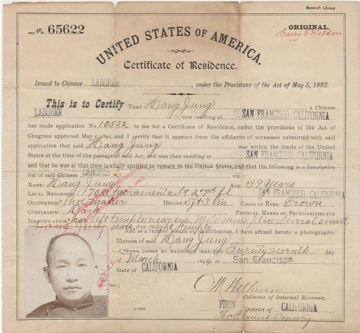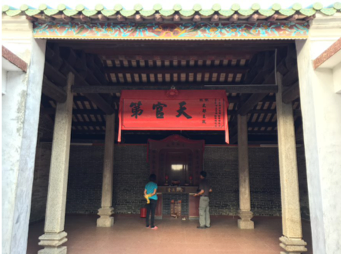Would you like to find out more about your Chinese ancestors? Perhaps discover their ancestral village and learn which dialect they spoke? These expert tips from My China Roots show you how to get started.
Would you like to find out more about your Chinese ancestors? Perhaps discover their ancestral village and learn which dialect they spoke? These expert tips from My China Roots show you how to get started.
At My China Roots, we often receive requests from the descendants of Chinese migrants who only remember vague details about their ancestor: that his surname was Fung, that he arrived on a boat from South China, and that he came to work on the railroads of North America, in the tin mines of Malaysia, the guano caves of Peru, or the sugar plantations of Cuba.
The hardest part of a journey, however, is always the first step, so here are our top 5 tips on researching your Chinese ancestors:
![A certificate of residence from the era of the Chinese Exclusion Act]() Tip 1: Find your ancestor’s surname in Chinese characters
Tip 1: Find your ancestor’s surname in Chinese characters
All research starts with finding out your ancestor’s name. A romanized English, however, name is not much use as there will be no trace of that name back in China.
The first port of call to look for your ancestor’s name in Chinese characters is to find out whether your family kept any information at home.Look out for:
- Letters, newspaper clippings, photos, notebooks, heirlooms, travel or ID documents
- Graves and tombstones with Chinese inscriptions
Next, reach out to organizations your ancestor may have been involved in, such as Chinese Clan Associations, which sometimes kept archived members’ lists in Chinese.
Tip 2: Figure out which dialect your ancestor spoke
 If you can’t find your ancestor’s name in Chinese characters, it’s possible to figure it out. However, this may require some patience as, historically, Chinese migrants spoke various distinct dialects. As a result, a single surname could be pronounced and written in several different ways.
If you can’t find your ancestor’s name in Chinese characters, it’s possible to figure it out. However, this may require some patience as, historically, Chinese migrants spoke various distinct dialects. As a result, a single surname could be pronounced and written in several different ways.
For genealogists, this can be confusing: for example, the surname 陳can be romanized as Chen, Chin, Chan, Chinn, Tan, Dan, Tin, Tjin, or Ting. Likewise, ‘Fung’ could either be the Hakka romanization of surnames Fung 房, Fung 方or Fung 洪, or the Cantonese romanization of Fung 馮. Nonetheless, it is crucial to narrow your search to the correct surname.
A good starting point is Wikipedia’s List of Common Chinese Surnames. Alternatively, My China Roots can provide a simplified Chinese Surname Database upon request.
If you’re unsure as to which dialect your ancestor spoke, looking at historical migratory trends may shed some light on the matter.
For example:
- Most Californian Chinese came from Szeyup (‘Four Counties’): in Guangdong province, and mainly spoke Taishanese and Cantonese.
- Most Filipino Chinese came from the cities of Quanzhou and Xiamen in Fujian province, and spoke Hokkien.
- Most Jamaican Chinese came from the Huizhou and Bao’an counties near Shenzhen in Guangdong province, and spoke Hakka.
Tip 3: Learn about your clan’s origins
Most Chinese surnames emerged around 3000 years ago, and historians are able to pinpoint the exactfounding family of each lineage!
Take the surname ‘Wong’王. Meaning ‘king’, it is the one of the most common Chinese surnames par excellence. According to historical records, in the 6thcentury BC, a haughty prince named Zi Qiao disgraced himself by criticising the king, and as punishment, was downgraded to the status of common civilian. As people still considered his to be a royal clan, Zi Qiao and his descendants took on the surname ‘Wong’. Today, most of the 98 million Wongs in mainland China are thought to be descendants of this disgraced prince.
Wikipedia provides basic information about the origins of major Chinese surnames. For more detailed accounts, you can check out China’s online encyclopedia, Baidu.
Tip 4: Find the ‘Holy Grail’ of Chinese Genealogy
For centuries, Chinese clans have recorded family histories in jiapu家谱and zupu族谱, also known as genealogy or family history books.
Containing details of everything from a clan’s ancient origins and 3,000-year-old ancestral lineage to its rules, traditions, biographies, histories and generation poems (which dictate how to name new family members according to generation), this is the ultimate prize for any Chinese genealogist.
Some of these zupucan be found online at FamilySearch’s database of Chinese genealogies, or the online databases of Chinese provincial and municipal libraries (note that these are in Chinese only).
Alternatively, My China Roots is the process of compiling the world’s first interactive, online database of overseas Chinese family zupu– you can try the beta here.
![An ancestral hall discovered on a recent roots trip]() Tip 5: Visit your ancestral village
Tip 5: Visit your ancestral village
Despite the recent trend in favourof digitization, your best bet at finding your family’s zupu s still to go to your ancestral village.
Visiting your ancestral village can also help track down further traces of Chinese ancestry includingfamily members, residences, gravesites or even ancestral temples!
If you’re able to find out the name of your ancestral village, the next step is to contact the village leadership with (if you have them) photographs and information about your ancestors. They’ll be able to provide you with relevant information about your family.
Act fast though: according to one Chinese study, 80 to 100 villages are disappearing each day to make space for new developments. Thus, urbanization is happening at the expense of cultural heritage and, for those with an interest in tracing their Chinese ancestry, the time is nigh to get going.
Need some help with your family history research in China? My China Roots can help you every step of the way: from figuring out your ancestor’s Chinese name, understanding the reasons why they left, to researching your clan’s ancestral origins. Visit our website or contact us at [email protected] today!
QUICK LINK: Learn new family history skills with the talks and workshops at the Family Tree Live event in London, 26 and 27 April 2019.








 Tip 1: Find your ancestor’s surname in Chinese characters
Tip 1: Find your ancestor’s surname in Chinese characters Tip 5: Visit your ancestral village
Tip 5: Visit your ancestral village